Coordinación
Una coordinación sólida puede evitar vacíos y duplicaciones en las respuestas humanitarias, así como garantizar que los PTM complementen otros tipos de asistencia. Sin embargo, el informe del «Estado Global de los Programas de Transferencias Monetarias» de la CALP Network muestra que la coordinación de la asistencia en efectivo es vista como débil y ad hoc, y que esto está teniendo graves repercusiones operativas.
Los donantes, las ONG y los líderes de los grupos de trabajo de transferencias monetarias (GTM) han pedido claridad sobre tres temas principales relacionados con la coordinación de la asistencia en efectivo:
- Quién debe ser responsable de asegurar una coordinación eficaz de la asistencia en efectivo;
- Cuál es la función y el mandato de los grupos de trabajo de transferencias monetarias, incluso en relación con las transferencias monetarias multipropósito;
- Cómo se debe dotar de recursos a la coordinación de asistencia en efectivo.
Tenemos que basarnos urgentemente en lo que funciona y proporcionar claridad a nivel mundial sobre las preguntas arriba mencionadas, adaptándonos a los diferentes contextos. Hace mucho tiempo que se deberían haber tomado decisiones claras basadas en necesidades operativas y no en la política de las agencias.
Prioridades actuales
El objetivo de la CALP Network es contribuir a seguir progresando en este tema en tres niveles: apoyar a los grupos de trabajo de transferencias monetarias a nivel regional; contribuir a soluciones prácticas para la coordinación de la asistencia en efectivo a nivel mundial; y convocar una discusión basada en la evidencia sobre temas clave, destacando puntos de decisión críticos y oportunidades de progreso.
Contenido destacado

Cash Coordination Tip Sheet
Guidelines and Tools
This tip sheet sets out established best practice, key guidance and resources for all aspects of cash coordination, intended as a clear, accessible and action-oriented guide for those engaged in coordination of cash and voucher assistance (CVA) at the field level.

Introducing the Cash Coordination Tip Sheet
Webinar
The CALP Network has developed a tipsheet setting out established best practice and key guidance and resources for all aspects of cash coordination, intended as a clear, accessible and action-oriented guide for those engaged in coordination of cash and voucher assistance at the field level.

Cash Coordination: A proposal from members in MENA
Blog Post
Earlier this year the CALP Network undertook regional consultations to explore options for cash coordination. This blog lays out recommendations from participants from the Middle East and North Africa who sketched out what cash coordination, and coordination more broadly, could look like in future to support a more effective, efficient and accountable response.
Últimos recursos
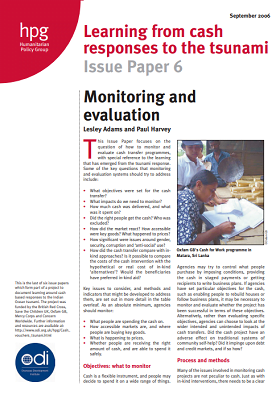
Learning from Cash Responses to the Tsunami: Issue Paper 6: Monitoring and Evaluation
Report
This is the last of six issue papers which form part of a project to document learning around cash-based responses to the Indian Ocean tsunami. The project was funded by the British Red Cross, Save the Children UK, Oxfam GB, Mercy Corps and Concern Worldwide. This Issue Paper focuses on the question of...
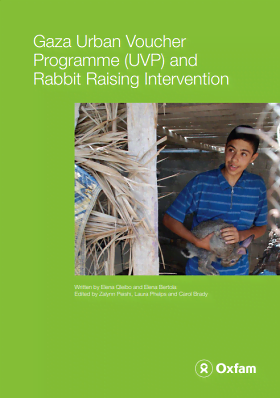
Gaza Urban Voucher Programme (UVP) and Rabbit Raising Intervention
Case Study
This case study looks at an Oxfam commodity voucher programme which supported households to improve their access to food, as well as a rabbit rearing intervention to help protect the livelihoods of unemployed people in the Gaza. The document looks at the rationale for programme choice, the project...

Construyendo Comunidades: Apoyo integral a las familias realojadas y sus comunidades de acojida: vivienda, apoyo para mejorar los medios de vida y proyectos comunitarios
Informe
Este estudio de caso analiza el programa de la Cruz Roja Española de reconstrucción de viviendas que tuvo lugar entre 2007-09 en Sri Lanka, tras el devastador tsunami. Además de albergar esta intervención tuvo dos enfoques principales: subvenciones a nivel de hogar para volver a iniciar, apoyar el...
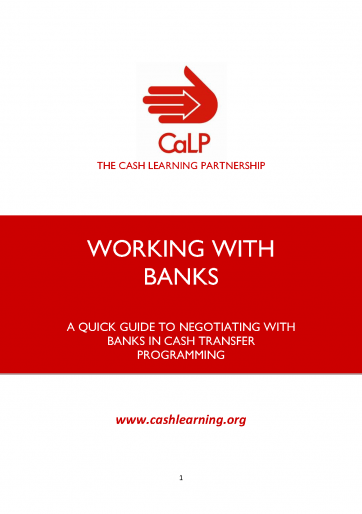
Working with Banks: A field guide to negotiating with banks in cash transfer programming
Guidelines and Tools
When delivering money through a banking system, aid agencies will have to negotiate with banks or other service providers to implement their chosen delivery mechanism. This field guide provides practical advice on how to negotiate with banks and maintain relationships with a financial institution. Much of...
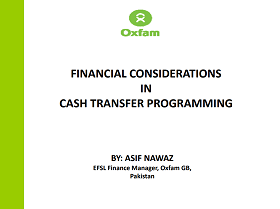
Financial Considerations in Cash Transfer Programming
Presentation
OBJECTIVES OF THE PRESENTATION • Finance considerations and challenges in CTP • Delivery Mechanisms used in the Flood Response. • Oxfam’s Experience with Order Cheques – Challenges and Innovation. • Delivery Mechanism’s – the selection dilemma.

Evaluation of OGB and HR Cash Consortium in Southern Somalia
Report
In response to the humanitarian emergency of 2006 in southern Somalia, a consortium of five agencies – Oxfam GB, Horn Relief, AFREC, WASDA and Development Concern – implemented the Emergency Drought Response Action (EDRA) programme. This was a cash-based intervention using an innovative approach with...
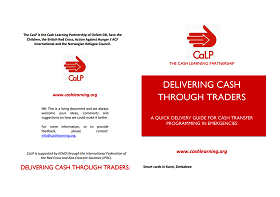
Delivering Cash Through Traders – A Quick Delivery Guide (booklet)
Guidelines and Tools
A Quick Delivery Guide to delivering money through local traders. Prepared as a practical tool, this guide provides a brief synthesis of the necessary preconditions and advantages and disadvantages of using cheques. It also provides practical implementation tips. This version of the Quick Delivery...
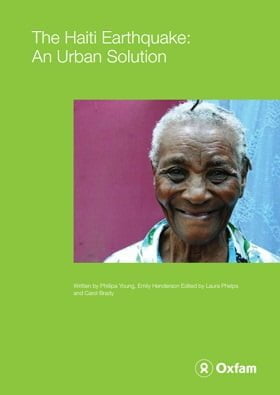
The Haiti Earthquake: An Urban Solution
Case Study
This case study looks at the Oxfam economic and livelihood recovery programme following the devastating earthquake in early 2010. A range of cash transfer programming was implemented after a detailed assessment was carried out. The report goes through the assessment stages, details the programme...
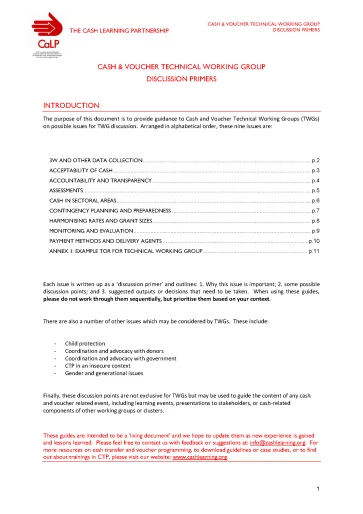
Cash & Voucher Technical Working Group Discussion Primers
Guidelines and Tools
The purpose of this document is to provide guidance to Cash and Voucher Technical Working Groups (TWGs) on possible issues for TWG discussion. This guide includes 9 key topics that a TWG may need to discuss, and for each outlines why the issue is important, possible discussion points, and suggested...
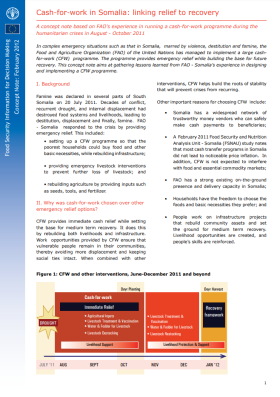
Cash-For-Work in Somalia: Linking relief to recovery
Policy paper
In complex emergency situations such as that in Somalia, marred by violence, destitution and famine, the Food and Agriculture Organization (FAO) of the United Nations has managed to implement a large cash-for-work (CFW) programme. The programme provides emergency relief while building the base for...

WFP’s Current C&V Portfolio
Presentation
A presentation aimed at solidifying a common understanding of where WFP is and where it is going. Topics include: Shift from food aid to food assistance From pilots to scale Portfolio trends since 2009 Global C&V by programme category.

Support to IDP Education and Pupils Transition from ABE to Formal School in Puntland
Report
This report discusses the findings and recommendations from the final evaluation of a pilot project that aimed at: (i) enabling 1,000 displaced and other vulnerable children in IDP settlements around Bossaso, Puntland, to access quality primary education and (ii) improving the learning environment in 10...

Water Access by Voucher
Report
This document presents an overview of the use of vouchers to connect vulnerable people in Somalia with water during an emergency response. The document provides thorough and practical guidance to implementing a water voucher programme, covering all phases of the project cycle including: programme...
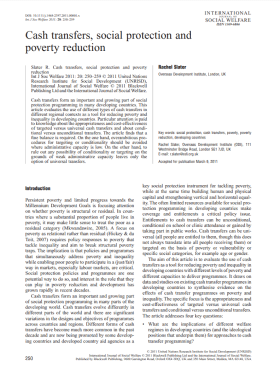
Cash Transfers, Social Protection and Poverty Reduction
Policy paper
Cash transfers form an important and growing part of social protection programming in many developing countries. This article evaluates the use of different types of cash transfers in different regional contexts as a tool for reducing poverty and inequality in developing countries. Particular attention is...

Protection
Guidelines and Tools
Protection mainstreaming is a practical, efficient and effective means to maximise the protective impact of aid programming. Through incorporating protection principles into aid design and delivery, humanitarian actors can:
Promote the human rights of affected populations
Enhance affected populations’...

Delivering Cash Through Cards – A Quick Delivery Guide (booklet)
Guidelines and Tools
A Quick Delivery Guide to delivering money through cards (magnetic stripe or smart cards). Prepared as a practical tool, this guide provides a brief synthesis of the necessary preconditions and advantages and disadvantages of using cheques. It also provides practical implementation tips. This version...
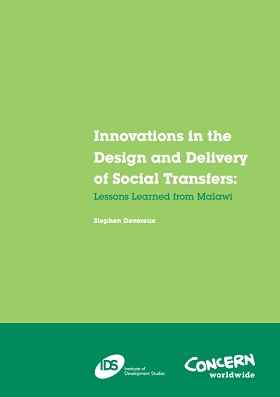
Innovations in the design and delivery of social transfers: Lessons learned from Malawi
Case Study
In 2005/6 and 2006/7, Concern Worldwide in Malawi designed and delivered two emergency social transfer programmes that were evaluated as innovative and effective, and have advanced thinking on best practice and what is feasible, both in emergency contexts and in the delivery of predictable (nonemergency)...

Nairobi Urban Social Protection Programme
Case Study
This case study of an Oxfam urban cash transfer programme in Kenya looks at how cash can be used as part of a national social protection programme to improve access to food of the most vulnerable households, at the same time as developing longer term food and income security initiatives. The report looks...
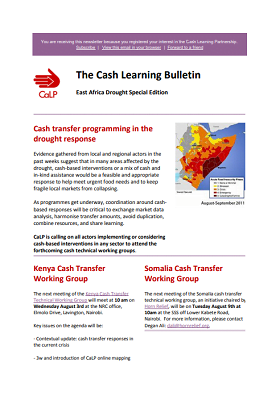
Cash Learning Bulletin: East Africa drought special edition
Report
A CALP Network bulletin with articles and information on: Cash transfer programming in the drought response Kenya Cash Transfer Working Group Somalia Cash Transfer Working Group Training on Cash Transfers in Emergencies and a list of appropriate links and resources.

Abogando por transferencias monetarias: guía rápida para la promoción de la programación de transferencias en efectivo
Guía y herramientas
Porque la programación de transferencias en efectivo (CTP) es todavía una forma relativamente nueva de la entrega de ayuda, los profesionales a menudo pueden encontrar que tienen que ser capaces de abogar por el uso de CTP, así como los miedos de las distintas audiencias. Esta guía tiene como objetivo...